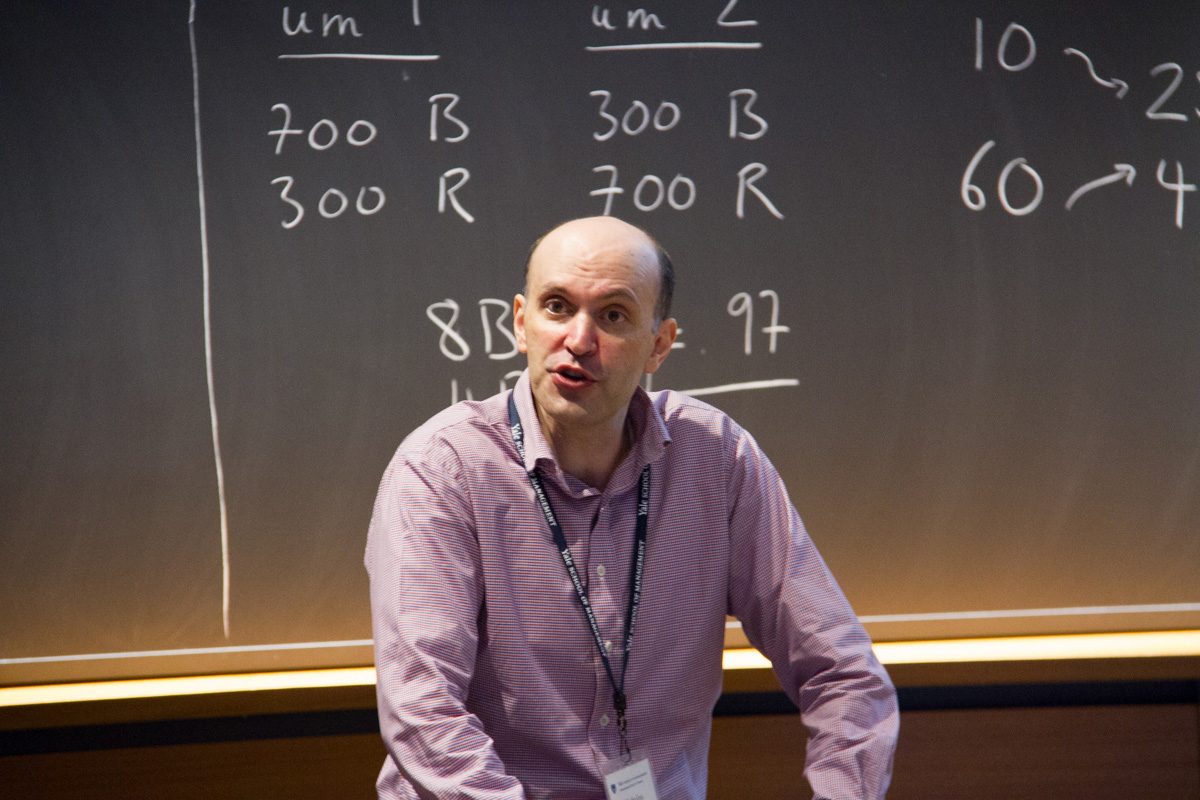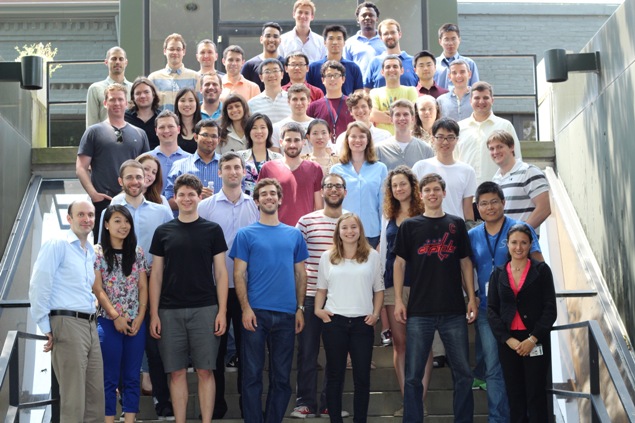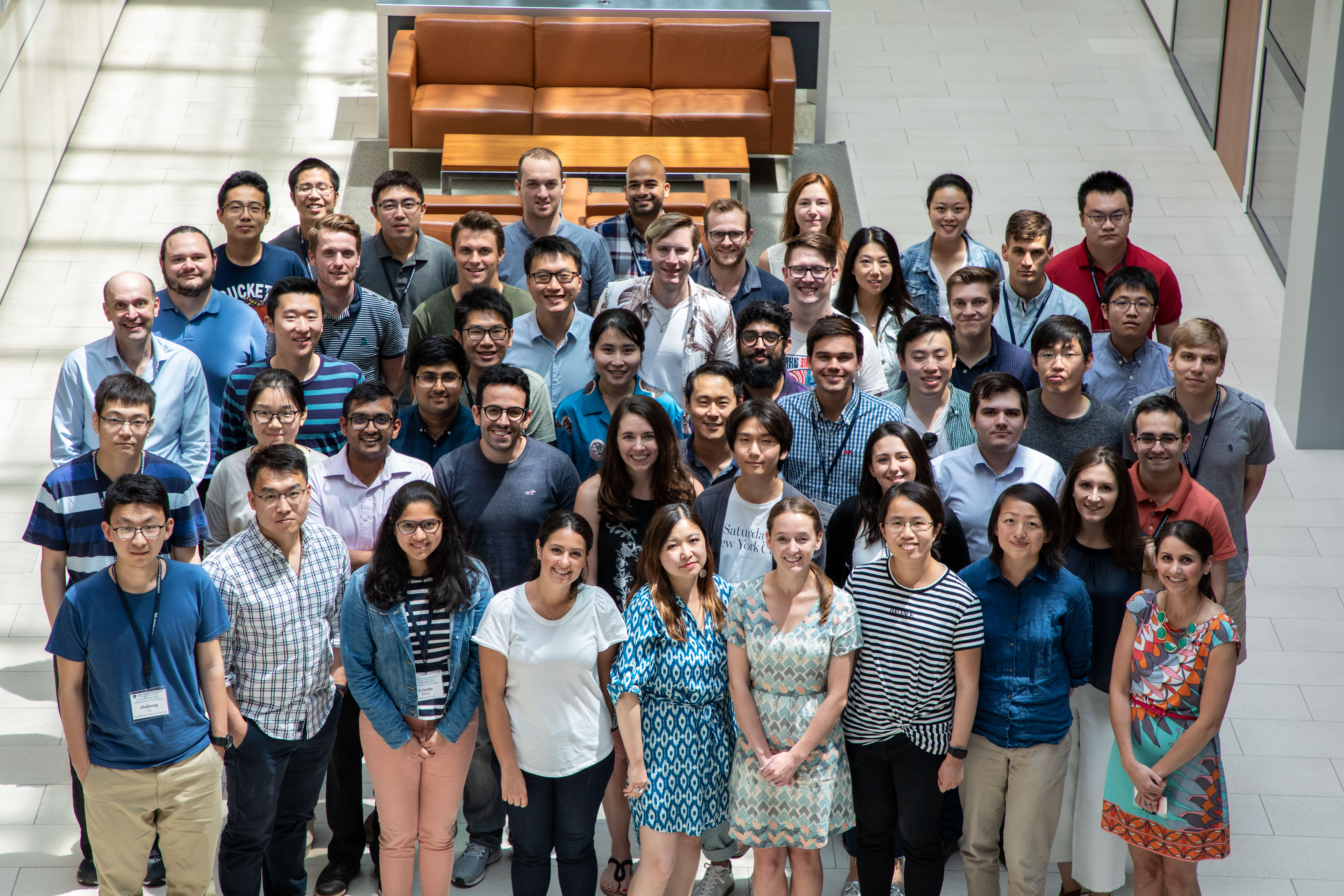NICHOLAS C. BARBERIS
Stephen and Camille Schramm Professor of Finance
Yale School of Management

Thank you for visiting my website at Yale SOM. Below, you can find:
- Contact information
- Curriculum vitae
- Research papers (with some non-technical summaries)
- Videos and other media
- Behavioral finance online lectures
- Former students
- NBER Working Group on Behavioral Finance
- Behavioral Economics Annual Meeting (BEAM)
- Yale Summer School in Behavioral Finance (** NEW **)
Contact information
-
Telephone
203-436-0777
nick.barberis AT yale.edu
Regular mail
Yale School of Management
PO Box 208200
New Haven CT 06520-8200
Courier mail
Yale School of Management
165 Whitney Avenue
New Haven CT 06511
Curriculum vitae
- Click here for a recent curriculum vitae.
Research papers
For the past 25 years, I have worked on behavioral finance, a large and vibrant field that tries to understand financial markets by way of psychologically realistic assumptions about human behavior. Together with my co-authors, I build models of investor behavior and asset prices that are rooted in the cognitive science of how people form beliefs and make decisions under risk.You can find more information about my research on my Google Scholar page here.
You can also click here for a description of my research agenda. (It's from a long time ago, but may still be of interest; I plan to post a new version soon.)
-
"Model-free and Model-based Learning as Joint Drivers of Investor Behavior", (with Lawrence Jin), July 2023.
-
"Prospect Theory and Stock Market Anomalies", (with Lawrence Jin and Baolian Wang), Journal of Finance 76, 2639-2687, October 2021.
-
"Psychology-based Models of Asset Prices and Trading Volume", in Bernheim, D., DellaVigna, S., Laibson, D. (Eds.), Handbook of Behavioral Economics, North Holland, Amsterdam, October 2018.
-
"Extrapolation and Bubbles", (with Robin Greenwood, Lawrence Jin, and Andrei Shleifer), Journal of Financial Economics 129, 203-227, August 2018.
-
"Richard Thaler and the Rise of Behavioral Economics", Scandinavian Journal of Economics 120, 661-684, July 2018.
-
"Prospect Theory and Stock Returns: An Empirical Test", (with Abhiroop Mukherjee and Baolian Wang), Review of Financial Studies 29, 3068-3107, November 2016.
-
"X-CAPM: An Extrapolative Capital Asset Pricing Model", (with Robin Greenwood, Lawrence Jin, and Andrei Shleifer), Journal of Financial Economics 115, 1-24, January 2015.Awarded the 2014 Jack Treynor Prize for research.
- "Using Neural Data to Test a Theory of Investor Behavior: An Application to Realization Utility", (with Cary Frydman, Colin Camerer, Peter Bossaerts, and Antonio Rangel), Journal of Finance 69, 907-946, April 2014.
-
"The Psychology of Tail Events: Progress and Challenges", American Economic Review Papers and Proceedings 103, 611-616, May 2013.
-
"Thirty Years of Prospect Theory in Economics: A Review and Assessment", Journal of Economic Perspectives 27, 173-196, Winter 2013.
-
"Psychology and the Financial Crisis of 2007-2008", in Financial Innovation: Too Much or Too Little?, Michael Haliassos ed., MIT Press, 2013.
- "Realization Utility" (with Wei Xiong), Journal of Financial Economics 104, 251-271, May 2012.
- "A Model of Casino Gambling", Management Science 58, 35-51, January 2012 (Special Issue on Behavioral Economics).
-
"Preferences with Frames: A New Utility Specification that Allows for the Framing of Risks" (with Ming Huang), Journal of Economic Dynamics and Control 33, 1555-1576, August 2009.
-
Non-technical summary here.
-
Non-technical summary here.
-
"What Drives the Disposition Effect? An Analysis of a Long-standing Preference-based Explanation" (with Wei Xiong), Journal of Finance 64, 751-784, April 2009.
-
Non-technical summary here.
-
Non-technical summary here.
-
"Stocks as Lotteries: The Implications of Probability Weighting for Security Prices" (with Ming Huang), American Economic Review 98, 2066-2100, December 2008.
-
Non-technical summary here.
-
Non-technical summary here.
-
"The Loss Aversion / Narrow Framing Approach to the Equity Premium Puzzle" (with Ming Huang), in Mehra, R. (Ed.), Handbook of the Equity Risk Premium, North Holland, Amsterdam, 2008.
-
"Individual Preferences, Monetary Gambles, and Stock Market Participation: A Case for Narrow Framing" (with Ming Huang and Richard Thaler), American Economic Review 96, 1069-1090, September 2006.
-
Non-technical summary here.
-
Non-technical summary here.
-
"Comovement" (with Andrei Shleifer and Jeffrey Wurgler), Journal of Financial Economics 75, 283-317, February 2005.
-
Non-technical summary here.
-
Non-technical summary here.
-
"Style Investing" (with Andrei Shleifer), Journal of Financial Economics 68, 161-199, May 2003.
-
Non-technical summary here.
-
Non-technical summary here.
-
"A Survey of Behavioral Finance" (with Richard Thaler),
in Constantinides, G., Harris, M., Stulz, R. (Eds.), Handbook of the Economics of Finance, North Holland, Amsterdam, 2003.
-
"Mental Accounting, Loss Aversion, and Individual Stock Returns" (with Ming Huang), Journal of Finance 56, 1247-1292, August 2001.
-
Non-technical summary here.
-
Non-technical summary here.
-
"Prospect Theory and Asset Prices" (with Ming Huang and Tano Santos), Quarterly Journal of Economics 116, 1-53, February 2001. Awarded the 2000
FAME Research Prize.
-
Non-technical summary here.
-
Non-technical summary here.
-
"Investing for the Long Run when Returns are Predictable", Journal of Finance 55, 225-264, February 2000. Awarded the 2000 Paul A. Samuelson Prize.
-
"A Model of Investor Sentiment" (with Andrei Shleifer and Robert Vishny), Journal of Financial Economics 49, 307-343, September 1998.
-
Non-technical summary here.
-
Non-technical summary here.
- "How Does Privatization Work? Evidence from the Russian shops" (with Maxim Boycko, Andrei Shleifer, and Natalia Tsukanova), Journal of Political Economy 104, 764-790, August 1996.
Videos and other media
-
Behavioral Finance at 40: Progress, Open Questions, and New Directions, the Annual Lecture at the 2025 meeting of the American Finance Association.
-
A one-hour talk on important developments in behavioral finance over the past decade. The slides are here.
-
You may also be interested in a panel session at the same meeting, Behavioral Finance 3.0, where I am joined by Ulrike Malmendier and Colin Camerer. The slides for my part are here.
-
A one-hour talk on important developments in behavioral finance over the past decade. The slides are here.
-
Taking a Disciplined Look at Irrational Investors, an interview from 2023 about my work and background.
-
Behavioral Finance, Presentation at "The Chicago School of Finance at 125" Conference at the Booth School of Business, University of Chicago, October 2023.
-
A short overview of the history of behavioral finance research and of some current research directions. My talk is the first 20 minutes of the video. There follow a presentation by another speaker and some open discussion.
-
The slides are available here.
-
A short overview of the history of behavioral finance research and of some current research directions. My talk is the first 20 minutes of the video. There follow a presentation by another speaker and some open discussion.
-
Behavioral Finance, Lecture at the Institute for Advanced Study, Hong Kong University of Science and Technology, November 2016.
-
If you are interested in a quick (40-minute) introduction to key ideas in behavioral finance, try this video.
-
If you are interested in a quick (40-minute) introduction to key ideas in behavioral finance, try this video.
-
Psychological Drivers of Asset Prices and Investor Behavior, Lecture at the London Business School Insight Summit, November 2018.
-
This is similar in content to the previous video -- an introduction to behavioral finance ideas -- in a more formal setting. It's a 35-minute talk followed by 10 minutes of questions.
-
This is similar in content to the previous video -- an introduction to behavioral finance ideas -- in a more formal setting. It's a 35-minute talk followed by 10 minutes of questions.
-
Silly Things Investors Do, Discussion with Tobias Moskowitz and Richard Thaler as part of the AQR Curious Investor podcast, 2018.
-
Behavioral Finance: Core Principles and Practical Applications, presented at the 2014 CFA Institute Annual Conference as part of their "masterclass" series.
-
The talk lasts about 90 minutes and is followed by 30 minutes of Q&A. It covers three well-developed ideas (over-extrapolation, overconfidence, and prospect theory) as well as three emerging topics (experience effects, social psychology, and neuroeconomics). Big theme: behavioral finance is about the important stuff, not just "the icing on the rational cake."
-
A reading list to accompany the talk is here.
-
The talk lasts about 90 minutes and is followed by 30 minutes of Q&A. It covers three well-developed ideas (over-extrapolation, overconfidence, and prospect theory) as well as three emerging topics (experience effects, social psychology, and neuroeconomics). Big theme: behavioral finance is about the important stuff, not just "the icing on the rational cake."
-
The Psychology of Individual Investor Trading, taken from the 2011 edition of "Investor," the first-year MBA class I teach at SOM.
-
The Psychology of the 2007-2008 Financial Crisis, presented at the 2009 Yale College Alumni Reunion.
Behavioral finance online lectures
In January 2017, as part of the American Economic Association's Continuing Education program, Ulrike Malmendier and I delivered a two-day, 12-hour course on behavioral finance. The lectures were recorded and are available for free online here.Master's students, PhD students, and faculty members in economics and finance who are interested in learning more about behavioral finance may find these lectures helpful. I did the first half (Parts 1 through 4) on applications to asset prices and investor behavior; Ulrike did the second half (Parts 5 through 9) on corporate finance applications. The slides for my part are here.
Former students
I devote a lot of time to working with PhD students and helping them with their dissertation research. Here are links to some of the students I have advised in past years. I very much recommend taking a look at their work if you are not already familiar with it!- Leland Bybee (Chicago Booth)
- Taha Choukhmane (MIT)
- Lauren Cohen (HBS)
- Henrik Cronqvist (Chapman University)
- Andrea Frazzini (AQR Capital)
- Cary Frydman (USC)
- Daniel Graves (Harvard economics)
- Allen Hu (University of British Columbia)
- Wenxi Jiang (Chinese University of Hong Kong)
- Lawrence Jin (Cornell)
- Bige Kahraman (Oxford)
- Peter Kelly (Claremont McKenna)
- Dong Lou (LSE / HKUST)
- Steven Malliaris (Loyola University Chicago)
- Ben Matthies (Notre Dame)
- Abhiroop Mukherjee (HKUST)
- Cameron Peng (LSE)
- Allen Poteshman (Cubist Systematic Strategies)
- Denis Sosyura (Arizona State)
- Kaushik Vasudevan (Purdue)
- Lei Xie (Cubist Systematic Strategies)
- Baolian Wang (University of Florida)
- Chen Wang (University of Notre Dame)
- Kangying Zhou (Texas A&M)
- Natalie Zhu (Edelman Financial Engines)
NBER Working Group on Behavioral Finance
In 1991, Robert Shiller and Richard Thaler co-founded the Behavioral Finance Working Group under the auspices of the National Bureau of Economic Research (NBER). They ran it for 24 years and, through twice-yearly conferences, built it into the leading venue for presentation of high-quality research in behavioral finance.I took over as Director in summer 2015. Below, you can find the programs of the 21 conferences I have organized as Director so far. About 80 of the most active researchers in the field attend each time; the spring meeting is in Chicago, and the fall meeting is in Cambridge, MA. Attendance is by invitation only, per NBER policy. However, the meetings are live-streamed on the NBER's YouTube channel, and everyone is welcome to watch the presentations and discussions there.
- Spring 2025, Fall 2025
- Spring 2024, Fall 2024
- Spring 2023, Fall 2023
- Spring 2022, Fall 2022
- Spring 2021, Fall 2021
- Spring 2020, Fall 2020
- Spring 2019, Fall 2019
- Spring 2018, Fall 2018
- Spring 2017, Fall 2017
- Spring 2016, Fall 2016
- Fall 2015
Behavioral Economics Annual Meeting (BEAM)
In 2009, Ulrike Malmendier (UC Berkeley), Ted O'Donoghue (Cornell), and I co-founded the Behavioral Economics Annual Meeting, known as BEAM for short. Our goal was to set up an annual conference where researchers in behavioral economics could gather to present and discuss their latest ideas.The conference has convened every year since 2009; Ulrike, Ted, and I have co-organized it each time. The event takes place in May and its location cycles between UC Berkeley, Cornell, and Yale. Every year, the event attracts about 100 of the most active researchers in the field. Because of capacity constraints, attendance is by invitation only. However, anyone is welcome to submit a paper for consideration; the deadline is in late January.
You can find more information about BEAM, including all past programs, at the official website here.
Summer school in behavioral finance
The Yale Summer School in Behavioral Finance is a one-week intensive course in behavioral finance for PhD students. The goal is to introduce students to the latest developments in the field and to give them a chance to interact with each other and with established researchers.The first program took place in the week of June 22nd, 2009. Six faculty from Yale and other universities taught the program and 40 students participated.
The second program took place in the week of June 27th, 2011. Eight faculty taught the program and 44 students participated.
The third program took place in the week of June 24th, 2013. Eight faculty taught the program and 46 students participated (see first photo below!).
The fourth program took place in the week of June 22nd, 2015. Nine faculty taught the program and 44 students participated.
The fifth program took place in the week of June 19th, 2017. Nine faculty taught the program and 42 students participated.
The sixth program took place in the week of June 24th, 2019. Ten faculty taught the program and 44 students participated (see second photo below!).
The seventh program took place in the week of June 13th, 2022. Eight faculty taught the program and 49 students participated.
The eighth program took place in the week of June 10th, 2024. Seven faculty taught the program and 46 students participated.
(** NEW **) The ninth program is scheduled for the week of June 8th, 2026. We welcome applications; the call for applications is here. The deadline for applications is Thursday, March 5th.

